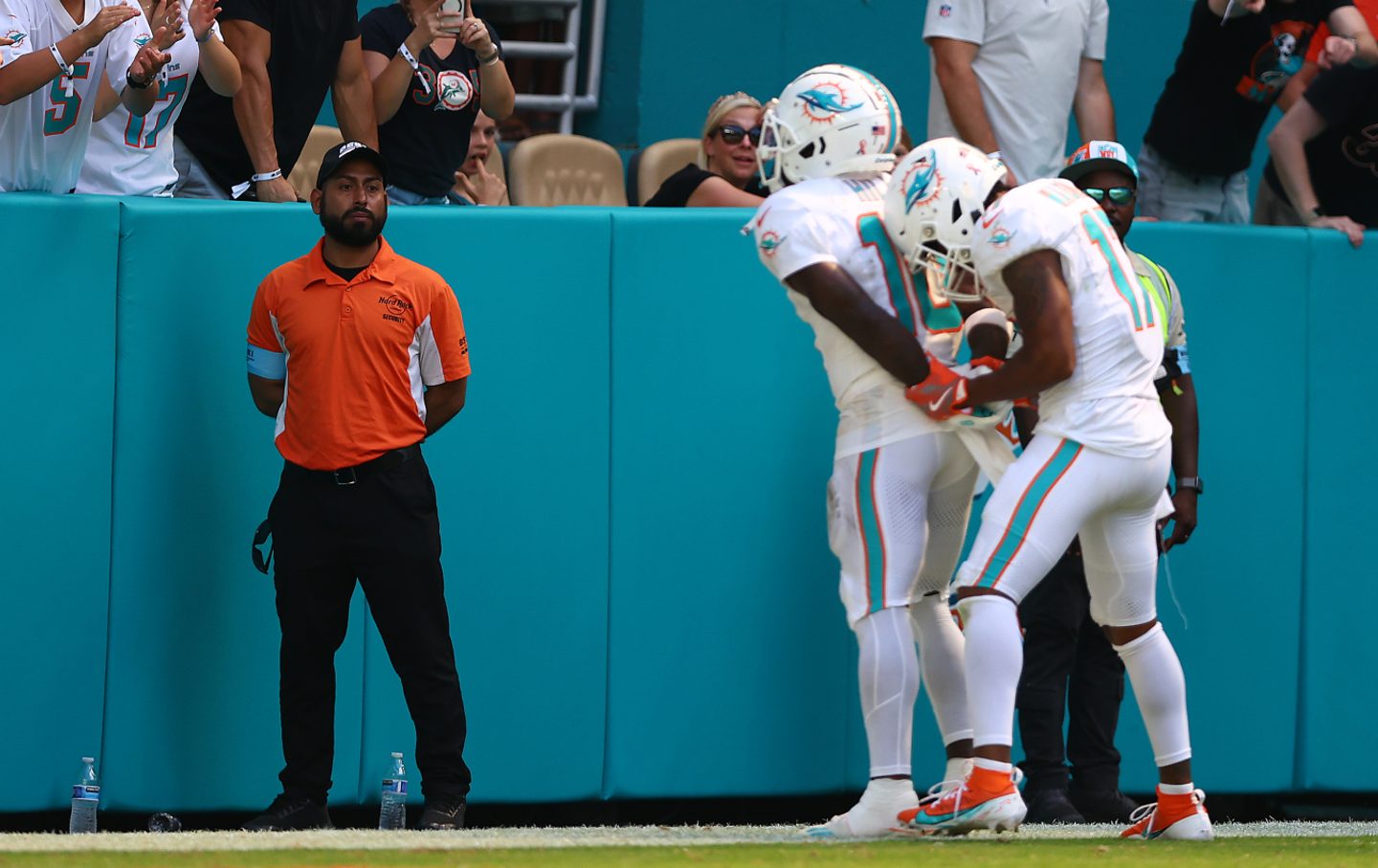Police Violence, Tyreek Hill, and the NFL Owners Who Bankroll Brutality
The NFL does not cross the police. The NFL partners with the police.

Tyreek Hill #10 of the Miami Dolphins and Jaylen Waddle #17 celebrate after Hill’s receiving touchdown on September 8, 2024, in Miami Gardens, Florida. Prior to the game, Miami-Dade police pushed Hill face down on the concrete and handcuffed him.
(Megan Briggs / Getty Images)
Before Sunday’s game, the Miami-Dade police pulled over Dolphins All-Pro wide receiver Tyreek Hill outside his hometown stadium. From the video footage, it’s clear that the police put Hill face down on the concrete—twice. One of the officers appears to have struck Hill while the NFL star was complying with orders. Because it was filmed, the media broadcast the incident within minutes. This news overtook the game-day hype before the first Sunday of the season, surely a distressing fact for NFL commissioner Roger Goodell.
After the game, one of Hill’s teammates, the 38-year-old locker-room leader Calais Campbell, said he tried to de-escalate the situation and that the police also cited and cuffed him. Against the Jacksonville Jaguars, Hill went on to play one of his typically brilliant games, but afterward he looked shaken when recounting the experience to the press. He quietly asked the question: “What if I wasn’t Tyreek Hill?”
You might expect the NFL to stand up for one of its most famous players, but the NFL does not cross the police. The NFL partners with the police. This is a league that blackballed quarterback Colin Kaepernick for kneeling during the national anthem to protest racist police violence after the killings of Alton Sterling and Philando Castile in 2016. It is also a league that, in the wake of outrage from all sides over how it handled Kaepernick’s protest, turned to public relations instead of honest dialogue. It wanted to be seen as a force to “end racism”—words it emblazoned in the back of every end zone. It would play “Lift Every Voice and Sing” before the “Star Spangled Banner.” Even Sunday’s news that rapper Kendrick Lamar had been chosen to play the halftime show at the next Super Bowl is a part of this agenda. (And if you’re surprised that the NFL would choose someone as political as Lamar, you might remember that the last time he played the Super Bowl halftime show, his lyrics about police killing civilians mysteriously disappeared.)
Notice what all of these gestures elide: They refuse to address what Kaepernick called upon the world to confront: racist police brutality and those in uniform “getting away with murder.” It immediately brought to mind last week’s scandal when a right-wing propagandist allied with James O’Keefe surreptitiously videotaped Washington football team vice president Rael Enteen. The O’Keefe Media Group is putrid, but it did catch Enteen telling truths that people “behind the shield” are afraid to utter. About the league’s anti-racist efforts, Enteen said, “It’s performative. It’s not done out of the goodness of their heart and morality. It’s done because George Floyd changed the game.… I mean that the social justice efforts are a performance for the sake of public perception and not because they want to actually push progress.”
O’Keefe’s minion asked if this kind of branding was being done to assuage “liberals,” and Enteen perceptively said: “No, I think it’s to make as much money as possible. I think the NFL cares about the bottom line like any corporation above all else. And they don’t need to really pinch pennies because they make so much revenue. Therefore, they can faux-prioritize DEI for the sake of good publicity.”
The Washington Commanders fired Enteen faster than a Tyreek Hill sprint to the end zone.
There were loud voices online that said Hill should not receive sympathy because of his ugly past of spousal and child abuse. While that behavior was awful, this is absurd. It is a logic that advances a reactionary line of thinking in which only a perfect victim deserves justice. The police did not know or care about Hill’s past, and it wouldn’t matter if they did. No one should be subject to state violence.
More on the NFL:
In the current political climate, this incident matters. One presidential candidate is calling for mandatory stop-and-frisk by the nation’s police and wants to grant police full immunity from charges of brutality. For these initiatives, despite his own criminality, he has been endorsed by the Fraternal Order of Police.
The other party, when faced with an opportunity to remake and rethink policing in 2020 following the murder of George Floyd, instead insisted on more funding for the police. And we will hear nothing from their candidate about policing so as not to take any position that could offend the nonexistent political middle—forget the fact that every “Cheney Democrat” could probably fit in a phone booth.
Eight years ago, amid a vacuum of leadership, NFL players started to build a movement, using their cultural visibility to fight back against racist police violence. The league killed it and offered a series of empty gestures in its stead. The NFL is run by billionaire franchise owners who are mostly Trump supporters—many of whom are bankrolling Trump’s promise of unaccountable policing. They are profiting off of Black bodies on the field and criminalizing them off of it. If Hill and Campbell want to understand why the police saw their lives as something less-than, they could start with the owner’s box. Their boss, the real estate developer Stephen M. Ross, is a friend of Trump’s and has fundraised for the former president. It all recalls the day in 2019 when mogul and rapper Jay-Z announced a partnership with the league. With Goodell sitting by his side, Jay-Z said, “We have moved past kneeling.” The NFL certainly has, and by the way, have you heard that Kendrick is playing the Super Bowl?








